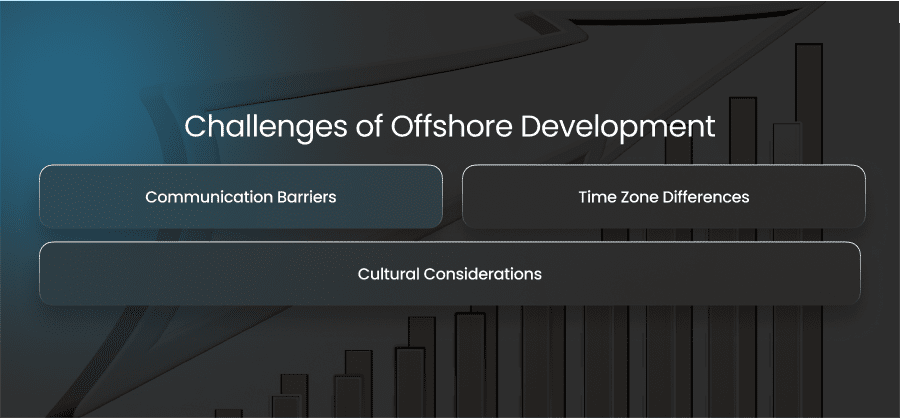Companies, particularly small and medium-sized ones, are ready to invest in both onshore and offshore software developers to fulfill the demand for efficient and exceptional bespoke software, not to mention enterprises are already operating with some part of their software development efforts fully outsourced. Building an external software development team to support your software development activities is therefore essential.
However, which outsourcing model best suits your company’s requirements? Are you more comfortable with offshore or onshore development? We try to answer this question in this blog.
Offshore Development
Hiring IT development teams from other nations to supplement your staff is known as offshore development. These teams usually operate remotely, handling time zone issues and cultural variations with ease.This development model is mostly motivated by cost-effectiveness. Now, let’s put things into perspective by adding some figures. For startups and SMBs, these services usually offer higher quality at lower costs. The market for software outsourcing is expected to grow significantly from $122 billion in 2024 to $283 billion by 2031, indicating its transformative impact on the custom software development industry.
Features of Offshore Development

Global Collaboration
Access to a varied talent pool is made possible by offshore development. Because teams are typically scattered across several nations and regions, good administration allows for a 24-hour development cycle.
Cost-Efficiency
Because operating costs are usually far lower offshore than onshore, offshore development provides considerable cost advantages. Because of this, it’s a desirable option for companies trying to maximize their spending.
Diverse Expertise
A variety of programming languages, frameworks, and tools are among the many capabilities that teams contribute. To guarantee top-notch development, they also keep up with the newest techniques and technology.
Advantages of Offshore Development

Cost Savings
Offshore development is far less expensive than other software development outsourcing options. The pay gap between rich and poor countries is the root reason for this.
Access to a Global Talent Pool
Businesses can access specialist talents and technology that might not be easily accessible locally through offshore development. For example, overseas marketplaces frequently offer professionals with extensive experience in these fields if you need React developers.
Flexible Scaling
Businesses may swiftly scale up or down development resources in response to project requirements because of the team’s excellent scalability. You may scale your development team with offshore teams without being constrained by regional labor regulations or the need to hire local expertise.
Challenges of Offshore Development

Communication Barriers
The first and foremost challenge in offshore development is communication barriers. Businesses frequently need to make investments in effective project management and communication systems, like Slack and Teams, to overcome this challenge.
Time Zone Differences
Another significant challenge companies face is working with development teams operating in different time zones. For instance, let’s say a U.S.-based company and a team are in different time zones, which might differ by nine hours, responding to or resolving important issues may take longer. However, companies are now using project management tools like Jira, Asana, and Clickup to ensure prompt resolution of issues.
Cultural Considerations
The beliefs, expectations, and work culture of your internal team may not always be shared by teams. If this is handled improperly, it might result in miscommunications or disparate work ethics that harm the project as a whole.
Onshore Development
Onshore development, which entails hiring teams in the same country or region to finish your software development project, is an additional option for software development outsourcing. Being close to the client makes this strategy special since it makes communication easier and ensures that the development team is aware of local laws, cultures, and customer preferences.
Features of Onshore Development

Proximity
It is convenient to meet in person for project kick-offs, reviews, or other crucial conversations because development teams are situated in the same nation as the customer.
Cultural Alignment
Teams working in the same country are likely to share similar cultural practices, work ethics, and communication styles, making collaboration smoother.
Local Regulations
Developing software for highly regulated sectors can benefit greatly from onshore teams’ superior knowledge of local laws, compliance procedures, and regulations.
Advantages of Onshore Development

Seamless Communication
The capacity for barrier-free, real-time communication is one of the biggest benefits of onshore development. Feedback loops don’t lag in a common time zone, and pressing problems may be handled right away. The development process is more open and effective as a result of this communication ease.
Alignment with Local Regulations
Development teams working onshore are familiar with local laws and business practices. A team can guarantee that your software satisfies all legal criteria for projects that need compliance with data protection legislation (such GDPR or HIPAA), lowering the danger of expensive penalties.
Quick Response Times
Onshore staff can react to urgent requests more rapidly because they are in the same time zone or location. Businesses that need to react quickly to changes or address urgent problems in real time would especially benefit from this.
Challenges of Onshore Development

Higher Costs
Onshore development teams typically come at a premium compared to offshore teams. In developed countries, the cost of living, salary, and overhead raises the price of software development services. This may be a big factor for startups and small firms with minimal expenditures.
Limited Talent Pool
There could be fewer developers with specific knowledge accessible depending on the nation or area, especially for specialist technologies. For instance, in certain local marketplaces, it may be more difficult to locate engineers with in-depth expertise in blockchain or machine intelligence.
Offshore vs. Onshore: Comparisons
1. Cost
Due to lower salaries in many parts of the world, offshore development is typically far more inexpensive. High-quality development is frequently available for a fraction of the price of local teams. But that is not all. Project management software, communication infrastructure, and, if required, in-person meetings may incur additional fees. You could concur that 57% of CEOs see cost reductions as the main justification for outsourcing, according to a Deloitte survey.
Because onshore teams are situated in areas with higher living conditions, they are more costly. The expenses are predictable, though, and you’ll avoid unforeseen fees that are frequently connected to teams, such as the cost of managing a distributed workforce or the requirement for additional communication equipment.
2. Quality of Work
Depending on the vendor and team’s level of experience, offshore development quality varies greatly. Reputable development firms are capable of producing high-caliber work, but it’s crucial to thoroughly screen the suppliers and consider their prior work or customer feedback.
Because they are used to the norms and expectations of the local sector, onshore teams often provide a better degree of consistency in quality. You also have the advantage of closer oversight and collaboration.
3. Communication
Time zone issues, cultural misinterpretations, and language barriers may all make it difficult to communicate with overseas staff. Even though many of these gaps have been filled by technology, communication issues might still arise.
Onshore teams share the same language and culture, which makes communication straightforward and effective. You can easily discuss project details, make real-time decisions, and resolve issues promptly.
4. Time Zone
Because offshore teams may operate in various time zones, project timeframes may be delayed and it may be challenging to get quick responses. However, by offering round-the-clock development, a competent team may overcome time zone discrepancies.
Because onshore development teams are in the same time zone, they may collaborate in real-time and resolve issues much more quickly. The flexibility to plan frequent check-ins and daily stand-ups guarantees that everyone remains in agreement.
5. Cultural Compatibility
It may take more effort for workers to understand the culture and demands of your companies and clients. Additionally, you may come across disparities in communication styles, work ethics, and approaches to problem-solving that, if not handled skillfully, may cause conflict.
Because teams share the client’s culture, cooperation is easier. This can guarantee that the team is in agreement with the company’s goals and lessen the possibility of misunderstandings.
6. Scalability
Because offshore teams frequently have access to a bigger pool of people and resources, they can provide flexibility in scaling up or down. Scaling can happen quickly without the need to wait for local hiring processes.
While onshore teams can be scaled up, it might take longer to recruit and onboard new talent, especially in specialized fields. The pool of available talent is typically smaller than in offshore regions.
When is The Best Time to Choose Offshore Development?
Accessing Specialized Skills
Going the offshore development path is an option if you want to construct a more cost-effective workforce while still having access to specific capabilities like blockchain, IoT, and AI.
Projects with Tight Budgets
Offshore development offers substantial cost reductions for projects that are sensitive to budget. For startups and small enterprises looking to maximize resources, lower labor prices in places like South Asia or Eastern Europe make it the perfect option.
When to Choose Onshore Development?

Onshore development might be the right choice if:
You Need Close Collaboration
The ideal choice if you require frequent meetings, in-person collaboration, and quick decision-making is onshore development. Coordinating the goals of your project requires regular team meetings.
Sensitive or Regulated Projects
When working on projects that need to comply with stringent data protection laws or governmental standards, onshore development is the better option. Working with a local team makes navigating the legal complexity simpler.
Quality and Transparency Are Top Priorities
If your primary objective is to guarantee high-quality work with transparent procedures, onshore development offers you greater control over the project and enables the real-time detection and resolution of any potential issues.
Developments and Trends in Outsourcing Software Development To Look Out For
1. Cybersecurity
Cybersecurity has unquestionably become essential for all businesses, and you should also take it seriously. Businesses may incorporate safe coding techniques, frequent audits, and data protection measures by contracting with professional cybersecurity teams to create software. In order to protect data, businesses are increasingly choosing partners with solid security credentials and emphasizing risk management.
2. Cloud Computing and Cloud-native App Development
Cloud computing gives businesses scalability and reasonably priced options. By 2025, 90% of all apps will be cloud native, predicts Business Wire. To build scalable, flexible apps, teams with experience in cloud-native app development use microservices and containers like Docker and Kubernetes.
3. AI And ML
You should focus on hiring AI and ML developers for your company as other businesses are also increasingly hiring them. By offering their expertise in creating AI-driven solutions like chatbots, recommendation engines, and predictive analytics, teams help organizations enhance automation and decision-making procedures.
4. Software Automation
Software automation is transforming how companies approach development processes. Businesses are outsourcing to take advantage of specialist automation capabilities for deployment pipelines, automated testing, and continuous integration. This guarantees quicker delivery of high-quality software solutions, increases productivity, and decreases manual labor.
Final Words
Numerous aspects, including budget, project needs, timetable, and level of collaboration required for your projects, might impact your decision when deciding between offshore and onshore development. Despite certain linguistic and cultural barriers, offshore development provides access to a worldwide labor pool and substantial cost reductions. Although onshore construction is more expensive, it facilitates collaboration and improves comprehension of local laws.




